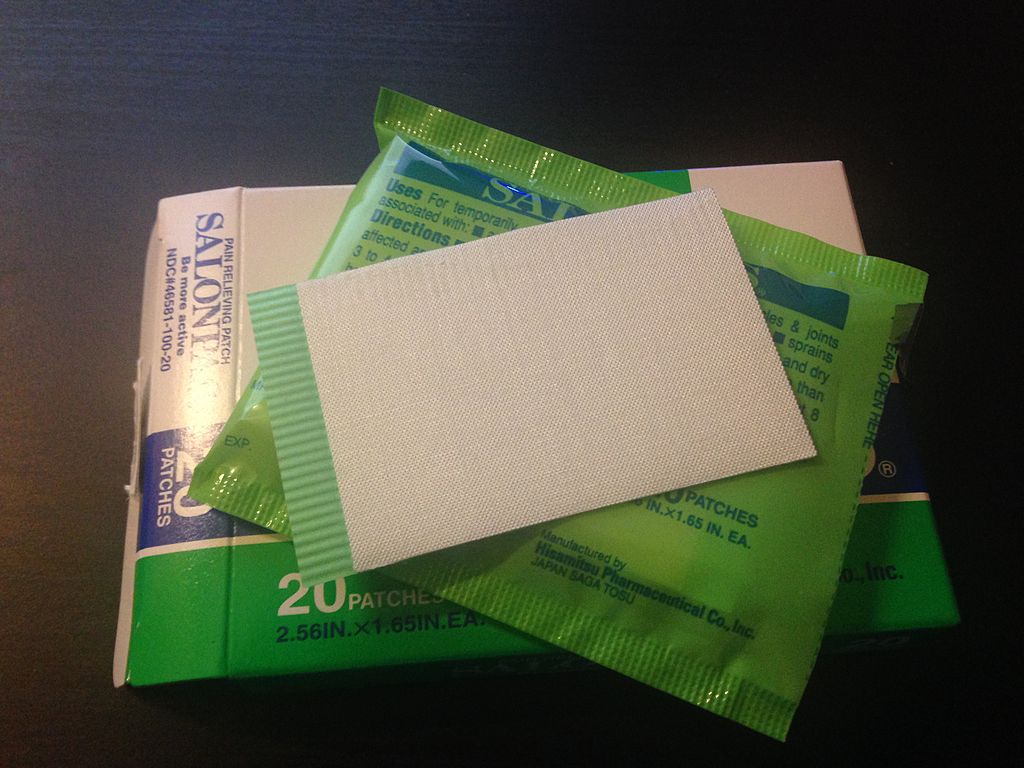Salonpas is an over-the-counter topical NSAID used to treat pain. It’s probably safe and might be worth trying for minor pain, but the effect is small and the advertising is more hype than substance.

Do you get annoyed when the media keep repeating the same commercials? I do. And recently I’ve been particularly annoyed by ads for Salonpas for pain. They make strong claims, but they don’t divulge the kind of details I want to know. What the heck is Salonpas, anyway? And where did that silly name come from?
What is Salonpas?
Salonpas is a suite of products sold over the counter in the form of patches, sprays, and gels. Most of them contain methylsalicylate and menthol, but some contain capsaicin, camphor, and lidocaine. A handy list of their products and ingredients can be found on Wikipedia. Two of their methylsalicylate/menthol patches are the only pain relief patches approved by the FDA. The company claims theirs is the strongest-labeled topical NSAID on the market; but as far as I could determine, there have been no studies comparing Salonpas to other topical products like diclofenac. The name means that the salicylate passes through the skin into the body. The company, Hisamitsu, did its own randomized trial and found that subjects using Salonpas reported significantly more relief (approximately 40% more) than those using a placebo patch. The study was said to be double-blinded, but was it really? It’s difficult to devise appropriate controls and to create double blind conditions, since both wintergreen oil and menthol cause skin irritation and both have distinctive odors. I could not find any replications or any studies by independent researchers.
First-line therapy?
The Arthritis Foundation recommends topical NSAIDs for joint pain relief, but the only one they mention is diclofenac, approved by the FDA in 2007 and available as gels, liquids, and patches. The advertising for Salonpas says “Two prestigious medical societies now recommend that physicians use topical NSAIDs, like Salonpas Pain Relief Patch LARGE, to treat acute pain from non-low back musculoskeletal injuries.” Both the American Academy of Family Physicians and the American College of Physicians recommend topical NSAIDs as first-line therapy. That’s true, but misleading. An article in American Family Physician says “Topical diclofenac and ketoprofen are slightly more effective than placebo for relieving chronic pain associated with osteoarthritis in adults.” They specify topical diclofenac and ketoprofen but do not mention other NSAIDs. The joint guidelines are questionable, since they also recommend acupressure. The quality of the studies varies, and the effect size is small.
Not for children
An FDA report says “To fulfill the PREA Postmarketing Requirement, a pediatric clinical study was conducted for Salonpas Pain Relief Patch and Salonpas Arthritis Pain topical patch and found them to be ineffective in this population. As a result, a pediatric labeling change was approved on March 29, 2013, for Salonpas Pain Relief Patch and Salonpas Arthritis Pain topical patch to note “Children under 18 years of age: Do not use; this product has not been shown to work in children.”
Is it an NSAID?
Salicylic acid is classified as a non-steroidal anti-inflammatory drug (NSAID), but topical methylsalicylate (wintergreen oil) is usually not, although it is metabolized in the body to salicylic acid. Wintergreen oil is probably more properly classified as a rubefacient. Rubefacients cause reddening of the skin, with dilation of capillaries and increased blood flow. The evidence for their efficacy is limited, and it has been speculated that when they relieve pain the effect is partly due to rubbing the skin. We instinctively rub painful areas; rubbing may work as a distraction or produce a pleasurable feeling that helps counteract the painful feeling. There are few trials of rubefacients, and better trials showed little difference from placebo.
According to the knowyourOTCs.org website, these brands contain methylsalicylate:
- BENGAY®
- Deep Heating®
- Flexall®
- Icy Hot®
- LISTERINE®
- Salonpas®
- Satogesic®
- THERA-GESIC®
Side effects
Side effects are usually minor, such as redness and skin irritation, but Salonpas might cause an allergic reaction. It should only be applied to unbroken skin and should not be used on children. It can interact with warfarin and certain other drugs to increase the risk of bleeding. There have also been reports of serious skin injuries and chemical burns.
Conclusion: More hype than substance
Salonpas may provide some degree of pain relief and is usually safe. Its effects are not very strong and the evidence is weak. It’s probably worth trying for minor injuries and other aches and pains before resorting to potentially more harmful remedies like oral NSAIDs or opioids. Is it a better choice than other topical over-the-counter products like BENGAY? We have no way of knowing, since there have been no head-to-head comparison studies.
This article was originally published in the Science-Based Medicine Blog
